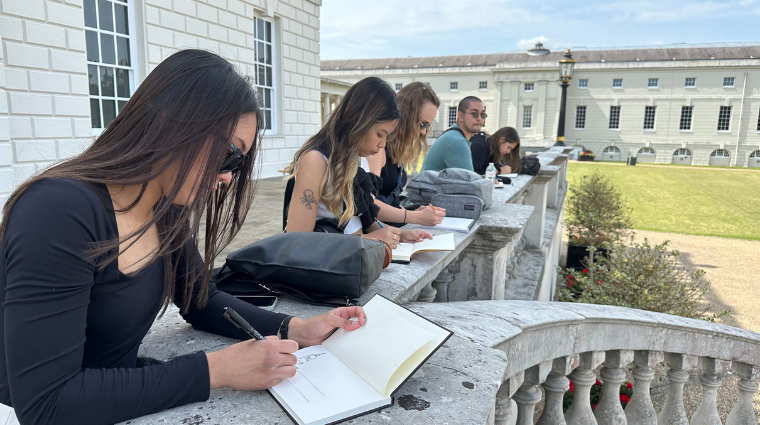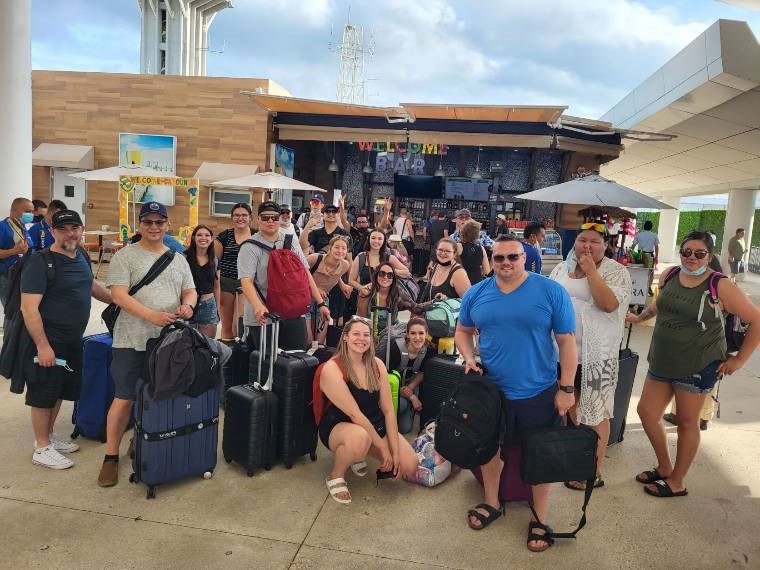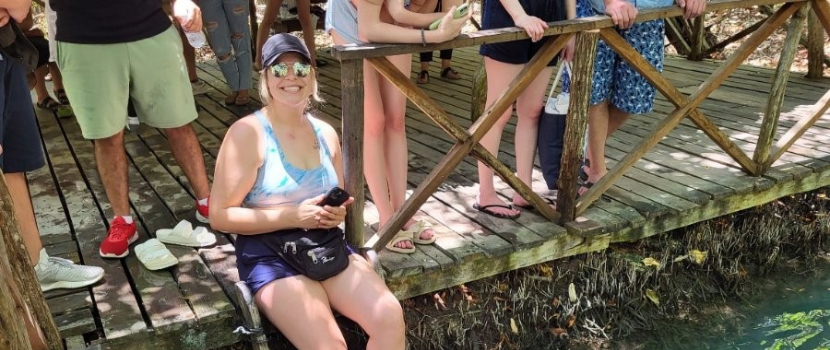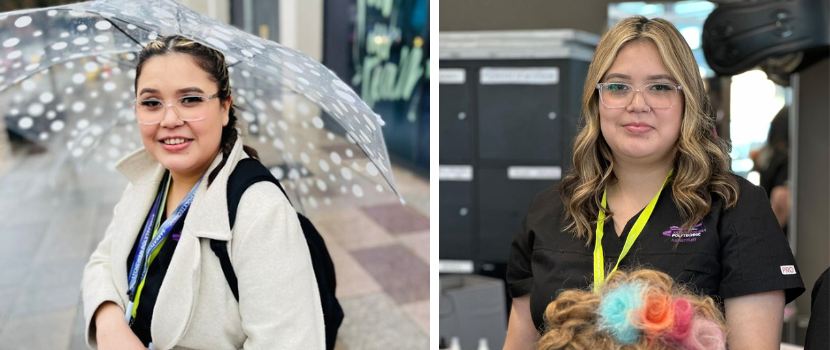REGINA — International Education Week showcases the impact that international education has in preparing students for the world and supports international engagement efforts—both at home and through travel. Saskatchewan Polytechnic’s pinpoints study abroad opportunities for its students as a key objective. Travel-based study give students a wealth of opportunity beyond their curricular program learning and today’s employers are increasingly looking for graduates with global skills. Studying abroad can provide students with experience and perspective that benefit both employer and employee—including intercultural communication skills, greater flexibility and increased global knowledge.
Typically, 40 to 50 Sask Polytech students experience intercultural learning through study abroad each year. Until recently, Indigenous participation lagged non-Indigenous student numbers. To determine why, Sask Polytech’s director of international partnerships and projects, Angela Wojcichowsky, conducted a research-based project with her team in 2020-21. “Our goals were to identify barriers Indigenous students encounter with study abroad opportunities,” she says, “and then develop and implement a strategy to support student mobility for this demographic.”
Indigenous students make up nearly 20 per cent of Sask Polytech’s student population. Data collected through Wojcichowsky’s survey of Indigenous students showed that nearly half of respondents were interested in study abroad, yet very few participated. Their reasons varied, but data indicated that most were first generation learners, many from remote areas. Cost was identified as the main barrier for 85 per cent of respondents. Family or work responsibilities and fear of travelling were also named as challenges. Many students, notes Wojcichowsky, simply didn’t have the knowledge or capacity required to apply and prepare for international travel.
With data in hand, Wojcichowsky and her team prepared a joint proposal in collaboration with Suncrest College (formerly known as Parkland College) to support an increased effort toward study abroad accessibility for this large demographic of students. It focussed on short- to medium-term mobility opportunities for Indigenous and low-income students, with emphasis on program alignment, transferable skills and intercultural skills and experiences. Colleges and Institutes Canada (CICan) supported the proposal and helped submit it to the Government of Canada’s Global Skills Opportunity (GSO) Fund, leveraging $700,000 in funding over four years.
Since then, Wojcichowsky and team have been working steadily with their colleagues in w墨t艒kam膩ht艒t膩n Indigenous Student Success to increase participation in study abroad by Indigenous students. The result has been encouraging. Study abroad at Sask Polytech has grown 30 per cent overall from 2021 until present. For Indigenous students the increase has been tenfold, with 300 per cent more participants than prior to implementing the strategy. By March 2025, 74 or more Indigenous students at Sask Polytech will have studied abroad with support from the GSO-funded initiative.
Direct financial support for Indigenous participants partly explains this shift—but the strategy Wojcichowsky’s team and partners developed goes much deeper than funding. “We have been working closely with w墨t艒kam膩ht艒t膩n Indigenous Student Success to identify academic programs with a high number of Indigenous students,” explains Wojcichowsky. “Justice studies, hairstyling and business administration are all program areas where we have introduced a study abroad opportunities for Sask Polytech Indigenous students.”
“We’ve also taken a holistic approach to address key barriers,” Wojcichowsky adds. “w墨t艒kam膩ht艒t膩n Indigenous Student Success collaborated with us to design and deliver wraparound supports to reduce some of the obstacles Indigenous students might face. This included developing pre-departure tools with an Indigenous lens.”
The teams have worked in collaboration to coach and mentor Indigenous students through the process. “Imagine you are a student from a small community,” says Wojcichowsky. “You may never have travelled out of province let alone abroad. Most of the students we have supported through this strategy don’t have passports — and some don’t have birth certificates or a relative or close friend who can verify their passport application because they don’t have one themselves.”
Deanna Kematch, director of w墨t艒kam膩ht艒t膩n Indigenous Student Success, says that this joint approach has been key to improving the uptake of study abroad opportunities by Indigenous students. “Together, we’ve also worked to engage deans and program faculty, as they are often the ones who champion this kind of opportunity with their students,” she says. “Angie’s team are experts in global mobility. My team are experts in supporting Indigenous student success. Together, we’ve been able to grow that success beyond our borders to give Indigenous students learning opportunities outside Canada, and that’s exciting.”


Tony Banman, a Métis student who travelled to London with the program this past September, says the experience was a valuable addition to his education. “I was amazed by the height of the ceilings and doors in Westminster Abbey and St. Paul’s Cathedral,” he says, “and how much bigger in scale they seemed in person than on television. We did an assignment comparing the architecture we’d seen in London with architecture in Saskatchewan, looking at the colonial influence of buildings. That was something I hadn’t thought about and it wasn’t difficult to find examples.”


Wojcichowsky, Kematch and their teams have worked to ensure that study abroad opportunities are relevant to program learning but also include cultural components, and where possible, sharing between Indigenous cultures. Lauren Greyeyes, a first-year student in the who travelled to Mexico for study abroad in 2022, speaks to the importance of cultural exchange. “It has been a really great experience in terms of seeing different perspectives, especially seeing how Mayan culture is very similar to that of our own,” she says. “I am very grateful for this opportunity.”


Martie McLeod, a student from Pelican Narrows, Peter Ballantyne Cree Nation who travelled to Wales this past March, called her experience life changing. “I now see things in a different perspective. It feels like I can do anything I set my mind to.” In 2023, Martie was chosen through a highly competitive selection process of study abroad participants from across Canada to take part in the GSO alumni reception, where she shared her insights and experiences from her international study abroad journey.
The GSO Fund, funded by Employment and Social Development Canada and administered jointly by CICan and Universities Canada, aims to empower post-secondary institutions to increase the participation of young Canadians—especially underrepresented students—in international learning opportunities both at home and abroad. “A main objective of this funding is to reduce barriers for students to engage in transformative international learning and work experiences,” says Andrew Champagne, CICan director of programs and partnerships. “We know global opportunities provide students in-demand skills and make them better prepared to succeed in the labour market. Saskatchewan Polytechnic’s Indigenous-focussed initiatives, designed to meet students where they are at and with culturally appropriate wrap-around services, particularly speak to these goals. Saskatchewan Polytechnic has contributed significantly to the overall success of the program.”
Wojcichowsky worked with CICan in 2023 and 2024 to gain an additional $225,000 towards this initiative, which so effectively merges two important Sask Polytech strategies. “We are proud of the progress we’ve made on this front and thankful for the GSO funding that has allowed us to tackle it together,” she says. Kematch agrees, adding, “Our Global Engagement Strategy is working hand in hand with our new . That’s Michif, meaning, ‘Helping each other with success for the future.’ By encouraging and helping our Indigenous students to participate in study abroad, we are allowing these students the same opportunities as their peers to go our and explore the world, share what they know and bring back new ideas and understanding.”
Visit for more information on opportunities offered at Sask Polytech.
— Submitted by Sask. Polytech Media Relations




